Mount Jiuhua: The Ultimate Pilgrimage Destination in China
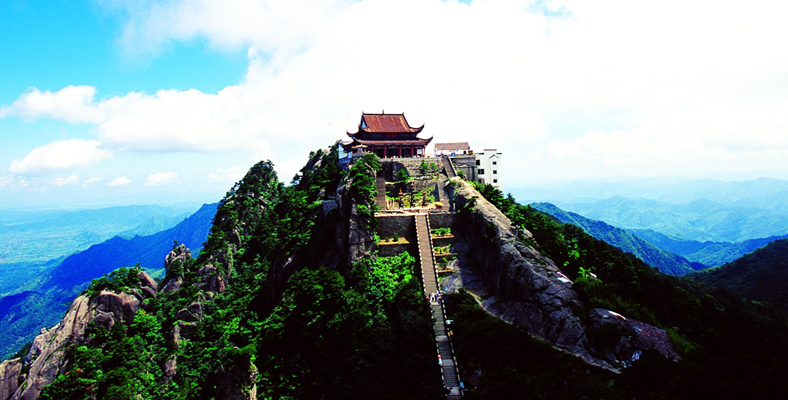
An Essential Guide to Visiting Mount Jiuhua
Nestled in the lush landscapes of Anhui Province, Mount Jiuhua, also known as Jiuhuashan, is a mesmerizing destination that captivates both fervent Buddhists and nature enthusiasts alike. Revered as one of China’s Four Sacred Buddhist Mountains, this holy site is dedicated to Ksitigarbha Bodhisattva, a compassionate figure known for guiding lost souls through the underworld. As you embark on your journey to Mount Jiuhua, prepare to be enchanted not only by its rich spiritual heritage but also by its breathtaking natural beauty, featuring 99 peaks that rise majestically like the petals of a lotus flower.
The mountain’s allure is steeped in history, with legends echoing through its ancient temples and tranquil paths. Since the arrival of the monk Beidu in 401 AD, who established the first temples here, Mount Jiuhua has been a pilgrimage site for centuries. Its scenic trails and sacred sites invite you to explore a world where nature and spirituality converge, offering a unique insight into Chinese Buddhism.
Whether you seek solace in meditation, the thrill of hiking through stunning landscapes, or a deeper understanding of Buddhist culture, Mount Jiuhua promises an unforgettable experience. With its picturesque vistas, rich cultural tapestry, and serene atmosphere, this sacred mountain is a must-visit for any traveler looking to connect with the spiritual essence of China. So lace up your hiking boots, grab your camera, and prepare for a journey that transcends the ordinary.
In This Guide
- An Essential Guide to Visiting Mount Jiuhua
- The Rich History and Legends of Mount Jiuhua
- Main Highlights: What You Absolutely Can’t Miss
- Planning Your Visit: A Practical Guide
- Tickets: Prices, Booking, and Tips
- How to Get There: A Complete Transportation Guide
- Local Cuisine and Accommodation Nearby
- Frequently Asked Questions
- Final Thoughts on Your Trip
The Rich History and Legends of Mount Jiuhua
Mount Jiuhua, known as Jiuhuashan in Mandarin, is a sacred destination steeped in rich history and legendary tales that resonate deeply within the heart of Chinese Buddhism. Nestled in Anhui Province, this mountain is one of the Four Sacred Buddhist Mountains in China, revered primarily as the holy site dedicated to Ksitigarbha Bodhisattva, the protector of souls in the afterlife.
The history of Mount Jiuhua can be traced back over 1,600 years, with its significance beginning in 401 AD when a monk known as Beidu arrived from India. He established temples and began spreading the teachings of Buddhism, laying the groundwork for what would become a pilgrimage site for countless followers. The mountain grew in prominence, especially after 719 AD, when Kim Qiaoque, a prince from the ancient kingdom of Silla (modern-day South Korea), chose to cultivate his spiritual practice there. He spent 75 years in meditation and, upon his death at the age of 99, his body remained incorrupt, leading many monks to believe that he was the reincarnation of Ksitigarbha Bodhisattva himself.
The mountain’s name, Jiuhua, is said to have originated from a poem by the famed Tang Dynasty poet Li Bai. He was inspired by the mountain’s unique formation of 99 peaks that resemble a blooming lotus flower. In his poem, he remarked on the divine beauty and significance of the sacred land, which led to the renaming from Mount Jiuzi to Mount Jiuhua. This literary connection has attracted numerous poets, scholars, and emperors through the ages, including Emperor Kangxi of the Qing Dynasty, who famously inscribed the phrase “Holy Land of Mount Jiuhua” on the mountain itself.
Visitors to Mount Jiuhua are not only treated to breathtaking views of its natural beauty but are also enveloped in a profound sense of history and spirituality. The mountain is dotted with ancient temples, pagodas, and halls, each steeped in stories and legends that echo through the ages. The architecture reflects the essence of Buddhist culture, providing a serene backdrop for meditation and reflection.
The allure of Mount Jiuhua extends beyond its historical significance; it is also a place of pilgrimage and reverence. Buddhists from all over China and beyond visit to pay homage to Ksitigarbha Bodhisattva, hoping to gain blessings and peace. The mountain serves as a reminder that, in Buddhism, the journey is as important as the destination; each step along the winding paths is a step towards enlightenment.
As you explore the trails of Mount Jiuhua, take a moment to absorb the legends that linger in the air, the voices of ancient monks that seem to whisper from the stone walls, and the breathtaking scenery that has inspired generations. This sacred mountain is not just a destination; it is a journey through history, faith, and the timeless beauty of nature.
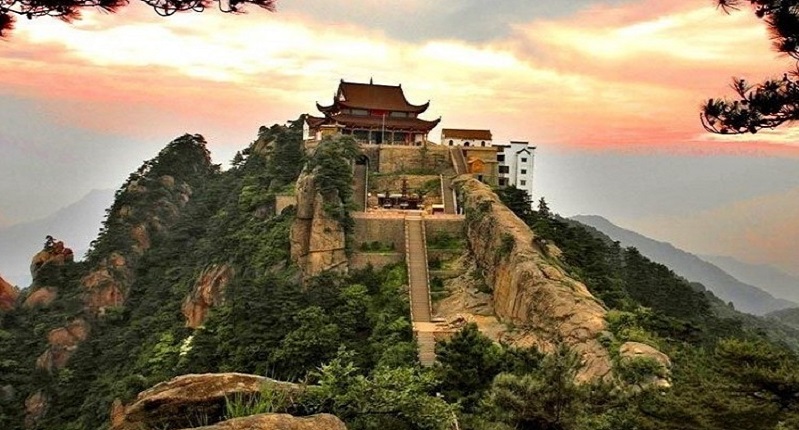
Mount Jiuhua.
Main Highlights: What You Absolutely Can’t Miss
When you set foot on Mount Jiuhua, you’re entering a realm where breathtaking natural beauty and rich Buddhist heritage intertwine. This sacred site, dedicated to Ksitigarbha Bodhisattva, is one of China’s Four Sacred Buddhist Mountains and offers a myriad of highlights that captivate both spiritual seekers and nature lovers alike.
Discover the Sacred Temples
1. Jiuhua Mountain Temple Complex:
The heart of Mount Jiuhua is its collection of temples, with the Jiuhua Temple being the most significant. Dating back over 1,600 years, this temple complex features stunning architecture and offers a serene atmosphere perfect for reflection and meditation. Be sure to explore The Hall of Ksitigarbha**, which houses intricate statues and murals dedicated to the Bodhisattva.
2. The Eternal Life Temple (Changshengsi):**
This temple is renowned for its historical significance and beautiful location. Visitors often marvel at its ancient structures and the spiritual ambiance that permeates the air. Don’t miss the chance to light an incense stick and make a wish at this revered site.
Hike the Scenic Trails
3. The 99 Peaks:
The name “Jiuhua” translates to “Nine Flowers,” symbolizing the legendary beauty of its 99 peaks resembling lotus flowers in bloom. Hiking the trails offers stunning panoramic views of the surrounding landscape, with paths suited for all fitness levels. The Zhuque Peak** is particularly popular, offering an exhilarating ascent that rewards hikers with breathtaking vistas.
4. Cableway Ride:
For those who prefer a more leisurely approach, the Jiuhua Mountain Cableway** provides a scenic ride that takes you high above the lush greenery. This aerial perspective allows you to appreciate the mountain’s grandeur from a unique angle, making it a must-do for anyone visiting.
Immerse in Local Culture
5. Cultural Performances and Festivals:**
Mount Jiuhua is alive with cultural festivities, especially during major Buddhist festivals. Experience traditional performances that celebrate the rich history of the region, including music, dance, and rituals that reflect the deep spiritual connection locals have with the mountain.
6. Local Cuisine:
Don’t leave Mount Jiuhua without trying some local delicacies. The area is known for its vegetarian Buddhist cuisine, prepared with fresh ingredients and often served in temple dining halls. Be sure to sample lotus root dishes and Buddha’s Delight**, a medley of vegetables and tofu that embodies the flavors of the region.
Unique Historical Footprints
7. Li Bai’s Poetic Legacy:**
As you explore, take a moment to reflect on the profound impact of historical figures like the Tang Dynasty poet Li Bai, who was inspired by the mountain’s beauty. His poem “Magic is divided into two branches, sacred mountain generates nine glories” resonates throughout the area, making it a point of interest for literature enthusiasts.
8. The Ksitigarbha Bodhisattva Statue:**
Standing tall, the statue of Ksitigarbha Bodhisattva is a striking sight and serves as a focal point for many visitors. This iconic landmark not only exemplifies the artistic mastery of the era but also represents the compassion and protection offered by the Bodhisattva.
Experience Spiritual Tranquility
9. Meditation and Retreats:**
For those seeking a deeper connection with the spiritual aspects of Mount Jiuhua, various temples offer meditation retreats and workshops. Engage in guided sessions that immerse you in Buddhist practices, allowing for personal reflection amid stunning natural surroundings.
10. Starlit Views:**
If time permits, stay overnight to witness the radiant night sky. The tranquility of the mountain combined with minimal light pollution offers a pristine view of the stars, providing a perfect backdrop for introspection or simply marveling at the universe.
A visit to Mount Jiuhua promises not only a journey through stunning landscapes but also an enriching experience steeped in history and spirituality. Whether you’re trekking its trails, exploring its temples, or savoring local dishes, this sacred mountain is a destination that truly captivates the heart and soul.
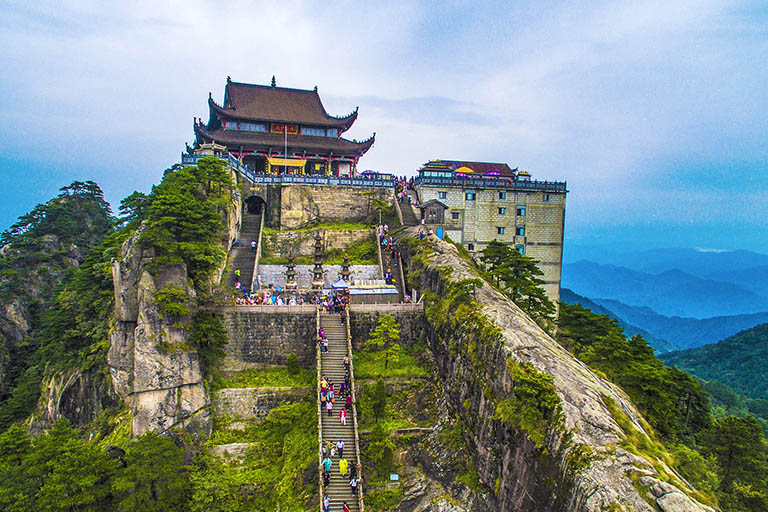
Mount Jiuhua.
Planning Your Visit: A Practical Guide
Planning Your Visit to Mount Jiuhua
Nestled in the enchanting province of Anhui, Mount Jiuhua, or Jiuhuashan, beckons travelers with its breathtaking landscapes and rich Buddhist heritage. As one of China’s Four Sacred Buddhist Mountains, it offers a unique blend of natural beauty and spiritual significance. Here’s a practical guide to help you make the most of your visit to this holy destination.
Getting There
Location
Mount Jiuhua is located in Qingyang County, approximately 20 kilometers from the downtown area of Chizhou City. The mountain is easily accessible by public transport or taxi from major cities.
Transportation Options
– By Train: The closest railway station is in Chizhou, where you can take a train from major cities like Shanghai, Hangzhou, or Nanjing. From Chizhou, local buses or taxis can take you to the mountain.
– By Bus: Long-distance buses operate from nearby cities, including Hefei and Anqing, directly to Jiuhua Mountain.
– By Car: Renting a car offers flexibility and the possibility to explore the scenic routes surrounding the mountain.
Best Time to Visit
Optimal Months
March through November is considered the best time to visit Mount Jiuhua. During these months, the weather is mild, and the flora is in full bloom, making for a picturesque setting.
Weather Considerations
– Spring (March to May): Mild temperatures and blooming flowers.
– Summer (June to August): Warm, but can be crowded; early mornings are the best time to explore.
– Autumn (September to November): Cooler temperatures and stunning fall foliage.
– Winter (December to February): Cold and less crowded, but some attractions may be closed.
Duration of Stay
Recommended Itinerary
To fully appreciate Mount Jiuhua, plan for a stay of one to two days. This allows ample time for exploration, hiking, and spiritual reflection.
Entrance Fees and Hours
Ticket Prices
– Regular Admission: 190 Yuan per person (January 16 to November 14)
– Off-Peak Admission: 110 Yuan per person (November 15 to January 15)
Opening Hours
The mountain is open from 8:00 AM to 5:30 PM. Arriving early will help you avoid crowds and soak in the serene atmosphere.
What to Bring
Essentials
– Comfortable Footwear: Hiking boots or sturdy shoes are a must for exploring the rugged terrain.
– Weather-Appropriate Clothing: Layers are advisable, as temperatures can vary significantly throughout the day.
– Water and Snacks: Keep hydrated and energized for your hikes.
– Camera: Capture the stunning vistas and the intricate details of the temples.
Key Attractions
- Temples and Monasteries: Explore the numerous temples dedicated to Ksitigarbha Bodhisattva, each offering a glimpse into the region’s spiritual history.
- Hiking Trails: With over 99 peaks, the hiking opportunities are abundant. Trails vary in difficulty, catering to both casual walkers and seasoned hikers.
- Cultural Sites: Don’t miss the ancient academies and historical sites that are steeped in the stories of poets and monks who have visited over the centuries.
Local Cuisine
Dining Options
While on your journey, indulge in local Anhui cuisine. Try dishes like:
– Stinky Tofu: A beloved local snack, fried to perfection.
– Bamboo Shoots: Fresh and flavorful, often used in many dishes.
– Jiuhua Mountain Tea: Savor a cup of this locally sourced tea, known for its delicate flavor.
Accommodations
Where to Stay
Accommodations near Mount Jiuhua range from budget hostels to upscale hotels. Consider booking a hotel with views of the mountain for an unforgettable experience. Popular options include:
– Jiuhua Mountain Hotel: Conveniently located, offering comfortable amenities.
– Local Guesthouses: For a more authentic experience, consider staying in one of the many guesthouses run by local families.
Final Tips
- Respect Local Customs: As a sacred site, maintain decorum, particularly in temples and during religious ceremonies.
- Plan Your Days: The hiking trails can take several hours, so plan your daily itinerary accordingly.
- Stay Connected: While exploring, enjoy the serenity of the mountain but ensure you have a reliable means of communication for safety.
By following this guide, you are well on your way to experiencing the spiritual and natural wonders of Mount Jiuhua, making your visit both memorable and enriching. Safe travels!
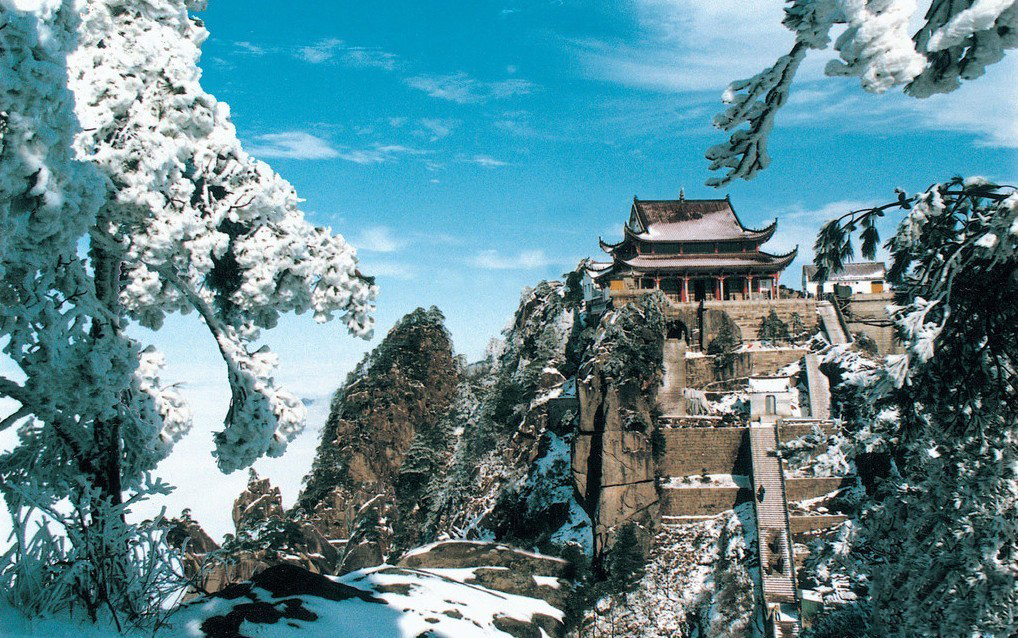
Mount Jiuhua.
Tickets: Prices, Booking, and Tips
When planning a visit to Mount Jiuhua, one of China’s revered Buddhist mountains, understanding ticket prices, booking options, and insider tips can enhance your experience.
Ticket Prices
- General Admission: The entry fee is 190 Yuan per person from January 16 to November 14. During the off-peak season, from November 15 to January 15, the price drops to 110 Yuan per person.
- Additional Costs: Please note that the ticket price does not include the fees for the cableway or sightseeing buses, which are available for those looking to explore the mountain more conveniently.
Booking Your Tickets
- Advance Purchase: It’s advisable to purchase tickets in advance, especially during peak visiting times from March to November. Tickets can be booked online through various travel platforms or directly at the entrance.
- On-Site Purchase: If you prefer spontaneity, tickets can also be bought on-site; however, be prepared for potential wait times during busy periods.
Tips for a Great Visit
- Plan Your Visit: Aim to allocate one to two days for your exploration. This allows ample time to soak in the breathtaking views and delve into the rich history and culture of the area.
- Best Times to Go: The ideal months to visit are from March to November, when the weather is generally pleasant and conducive for hiking and sightseeing.
- Arrive Early: To avoid crowds, consider arriving right when the park opens at 08:00 AM. This will give you a head start and allow for a more serene experience.
- Explore Beyond the Peaks: While the mountain’s peaks are stunning, take time to explore the temples and historical sites scattered throughout the area. Each has its own unique story and significance to the Buddhist culture.
- Transportation: If you’re traveling from Chizhou city, Mount Jiuhua is located about 20 kilometers away. Public transport options, taxis, or car rentals are available for your convenience.
Mount Jiuhua is not just a destination; it’s an experience steeped in spirituality and natural beauty. Ensuring you have the right tickets and a well-planned itinerary can make your visit truly memorable. Enjoy your journey to this sacred mountain!
How to Get There: A Complete Transportation Guide
Getting to Mount Jiuhua (九华山) is an adventure in itself, offering travelers a chance to experience the beauty of Anhui Province as well as the rich cultural heritage of one of China’s Four Sacred Buddhist Mountains. Whether you’re coming from a nearby city or traveling from farther afield, this guide will help ensure a smooth journey.
By Air
The nearest major airport to Mount Jiuhua is Chizhou Jiuhuashan Airport (JIU), located approximately 30 kilometers away from the mountain. However, this airport primarily serves domestic flights. For international travelers, the best options are:
- Huangshan Tunxi International Airport (TXN): About 80 kilometers from Mount Jiuhua, this airport has connections to several major Chinese cities, including Beijing, Shanghai, and Guangzhou.
- Nanjing Lukou International Airport (NKG): Roughly 170 kilometers away, it offers more international and domestic flights.
From either airport, you can take a taxi or arrange for a private transfer to reach Mount Jiuhua.
By Train
Mount Jiuhua is well-connected by rail, with Chizhou Railway Station being the closest major train station. Here’s how to get there:
- From Shanghai: Take a high-speed train from Shanghai Hongqiao Railway Station to Chizhou, which takes about 4-5 hours.
- From Nanjing: There are direct trains from Nanjing to Chizhou, roughly a 2 to 3-hour journey.
- From Hefei: High-speed trains from Hefei to Chizhou are frequent and take around 2 hours.
Once you arrive at Chizhou Railway Station, you can take a taxi or a local bus to the mountain.
By Bus
Long-distance buses are another option for reaching Mount Jiuhua. Buses frequently depart from major cities like:
- Hefei: Buses from Hefei to Chizhou take approximately 3 hours.
- Nanjing: There are regular buses from Nanjing that take about 4-5 hours.
- Shanghai: Buses from Shanghai to Chizhou are available, though the journey can take up to 7 hours.
From the Chizhou Bus Station, you can catch a local bus or taxi directly to Mount Jiuhua.
Local Transportation
Upon arriving at Mount Jiuhua, there are various options to explore the area:
- Sightseeing Buses: These buses operate within the scenic area, providing easy access to key attractions.
- Cable Cars: For those who prefer a scenic ride, the cable cars offer breathtaking views as they ascend to various peaks.
- Walking and Hiking: Many trails are available for those who wish to explore on foot, allowing for deeper immersion in the natural beauty and serenity of the mountain.
Tips for Travelers
- Plan Ahead: Check train and bus schedules in advance, especially during peak travel seasons when routes may be crowded.
- Language: English may not be widely spoken, so having a translation app or a phrasebook can be helpful.
- Cash: Although digital payments are common in China, it’s a good idea to carry some cash for small purchases, especially in rural areas.
By following these transportation tips, your journey to Mount Jiuhua will be as enjoyable as the destination itself. Embrace the spiritual ambiance and stunning landscapes that await you at this sacred mountain!
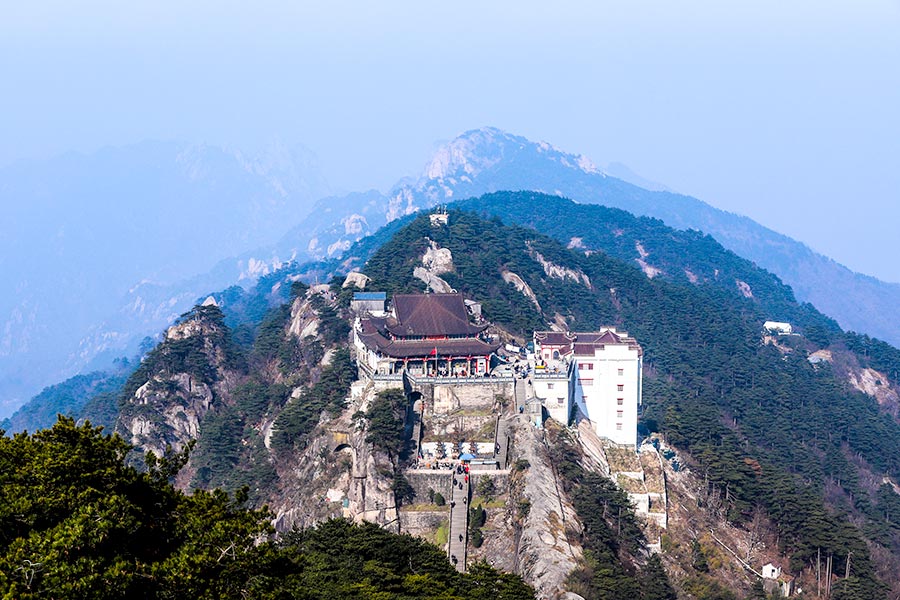
Mount Jiuhua.
Local Cuisine and Accommodation Nearby
When visiting the serene landscapes of Mount Jiuhua, immerse yourself not only in its breathtaking beauty but also in the local flavors and hospitality that the region has to offer. The area around this sacred mountain is rich in culinary delights, as well as a variety of accommodation options to suit every traveler’s needs.
Local Cuisine
As you explore Mount Jiuhua, be sure to indulge in the local Anhui cuisine, renowned for its bold flavors and fresh ingredients. Here are some must-try dishes:
-
Stinky Tofu (臭豆腐): A unique delicacy that’s worth trying for the adventurous eater. The dish is deep-fried and served with a variety of sauces, offering a complex flavor that is both savory and aromatic.
-
Jiuhua Mountain Tofu (九华山豆腐): This local specialty is made with fresh mountain spring water and is celebrated for its silky texture. Enjoy it in soups or stir-fried with seasonal vegetables.
-
Braised Pork (红烧肉): A classic dish in Anhui cuisine, this pork is slow-cooked until tender, coated in a rich, sweet-savory sauce that pairs perfectly with steamed rice.
-
Buddhist Vegetarian Dishes (素食): Given the mountain’s Buddhist heritage, many restaurants offer a wide selection of vegetarian dishes that are both creative and delicious. Look for stir-fried seasonal greens and mushroom-based dishes that highlight the flavors of the region.
-
Tea: Don’t miss out on sampling the local tea, particularly the famous Huangshan Maofeng tea, which pairs beautifully with your meals.
Accommodation Nearby
After a day of exploring the sacred sights and indulging in local cuisine, you’ll find several accommodation options that cater to various preferences and budgets:
-
Jiuhua Mountain Resort (九华山度假村): Nestled within the lush landscapes, this resort offers comfortable rooms with stunning views of the mountains. It’s an excellent choice for those looking to relax in a serene environment.
-
Mount Jiuhua Hotel (九华山宾馆): Located conveniently close to the main attractions, this hotel provides simple yet comfortable accommodations. It’s ideal for travelers who want easy access to the mountain’s trails and temples.
-
Buddha Zen Hotel (佛禅宾馆): Perfect for those seeking a spiritual retreat, this hotel embraces the Buddhist culture with its tranquil atmosphere and meditative spaces. The rooms are designed with simplicity and comfort in mind.
-
Guesthouses and Homestays: For a more local experience, consider staying in one of the guesthouses or homestays in the nearby villages. These options often provide a more intimate setting, where you can interact with local families and enjoy homemade meals.
-
Hostels: Budget travelers will find several hostels offering dormitory-style accommodations, ideal for meeting fellow adventurers while keeping costs down.
Final Thoughts
Whether you’re savoring the rich flavors of Anhui cuisine or unwinding in cozy accommodations, the area surrounding Mount Jiuhua promises a memorable travel experience. Embrace the local culture, and let the beauty and tranquility of this sacred mountain enhance your journey through China.
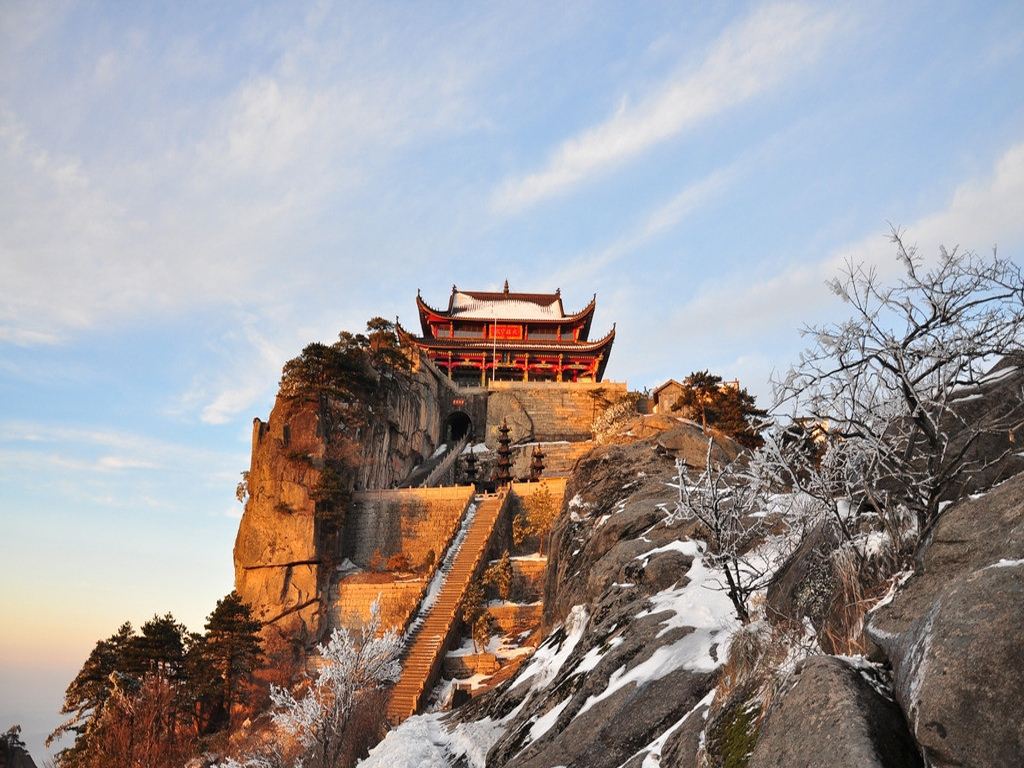
Mount Jiuhua.
Frequently Asked Questions
Frequently Asked Questions about Mount Jiuhua
1. What is Mount Jiuhua known for?
Mount Jiuhua, also known as Jiuhuashan, is one of the Four Sacred Buddhist Mountains in China, dedicated to Ksitigarbha Bodhisattva. It is renowned for its stunning natural beauty, rich Buddhist culture, and historical significance, attracting both spiritual pilgrims and nature enthusiasts.
2. When is the best time to visit Mount Jiuhua?
The best time to visit Mount Jiuhua is from March to November when the weather is mild and the scenery is at its most vibrant. During these months, you can enjoy pleasant temperatures and beautiful landscapes.
3. How long should I plan to stay at Mount Jiuhua?
A visit typically lasts one to two days, allowing ample time to explore the temples, hike the trails, and soak in the breathtaking views. If you’re keen on photography or wish to delve deeper into the local culture, consider extending your stay.
4. What are the opening hours and ticket prices?
Mount Jiuhua is open from 8:00 AM to 5:30 PM. Ticket prices are 190 Yuan per person from January 16 to November 14 and 110 Yuan per person from November 15 to January 15 of the following year. Note that cableway and sightseeing bus fees are not included in the ticket price.
5. How do I get to Mount Jiuhua?
Mount Jiuhua is located about 20 kilometers from Chizhou downtown in Anhui Province. You can reach it by taking a taxi or a local bus from Chizhou. Additionally, many travelers opt for guided tours that include transportation to and from the mountain.
6. Are there accommodations available near Mount Jiuhua?
Yes, there are various accommodation options near Mount Jiuhua, ranging from budget hostels to more luxurious hotels. Booking in advance is recommended, especially during peak tourist seasons.
7. What activities can I do while visiting?
While at Mount Jiuhua, you can explore ancient temples, hike the scenic trails, participate in meditation sessions, and learn about the rich history of Buddhism in the area. Don’t miss the opportunity to witness the stunning views from the mountaintop!
8. Is there anything specific I should pack for my trip?
When visiting Mount Jiuhua, it’s advisable to wear comfortable hiking shoes, dress in layers to accommodate changing weather conditions, and bring a water bottle, snacks, and a camera to capture the beautiful scenery. If you plan to visit temples, consider bringing modest clothing as a sign of respect.
Final Thoughts on Your Trip
As your journey to Mount Jiuhua draws to a close, take a moment to reflect on the profound experiences that this sacred mountain has offered. Steeped in rich Buddhist heritage and adorned with stunning natural beauty, Mount Jiuhua is not just a destination; it is a spiritual sanctuary that invites both introspection and awe.
Whether you wandered among ancient temples, marveled at the breathtaking views from its 99 peaks, or savored the tranquility of its lush surroundings, each moment spent here contributes to a deeper understanding of both nature and culture. The mountain’s history, intertwined with the tales of poets and monks, continues to resonate with those who seek solace and inspiration.
As you prepare to leave this enchanting land, carry with you the serenity of its landscapes and the wisdom of its teachings. Mount Jiuhua is more than a place to visit; it’s a journey into the heart of Chinese Buddhism and a reminder of the beauty that lies in both nature and spirituality. Embrace the memories you’ve created and let them enrich your travels ahead. Safe travels, and may your adventures continue to inspire!